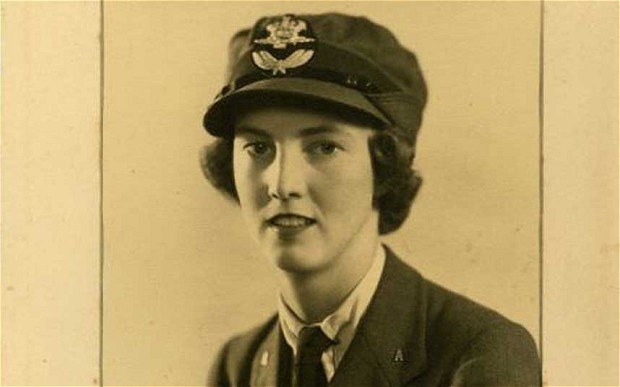Lady Llewellyn acted as a wartime cipher officer. She served at Fighter Command during the Battle of Britain and she later handled the Allies’ classified signals that led up to D-Day.
She was born Joan (Jo) Anne Williams on Christmas Eve in 1916 in the village of Llantwit Major in the Vale of Glamorgan. Her father was the chairman of Cardiff Gas, Coal, and Coke Company—just like his father and grandfather had been before him. He was also the MFH of the Glamorgan Hunt. Jo had no interest in riding but while she was at St. James’s West Malvern, she was head girl and proved that she was an excellent tennis player. She even competed at Junior Wimbledon.
In 1939, Jo was one of the first to volunteer for the Women’s Auxiliary Air Force (WAAF) and in August she was called to perform full-time service and commissioned.She trained as a codes and cipher officer, she was posted to the Head Quarter Fighter Command at Bentley Priory. The C-in-C Air Chief Marshall, Sir Hugh Dowding, developed a sophisticated control and reporting organization that relied on secured communications. Jo Williams served at the HQ throughout the Battle of Britain during the summer of 1940.
In 1941, she was at the RAF signal station at Leighton Buzzard—which was staffed by more than 600 service personnel who handled telephone, teleprinter, and radio communications. They were the people who connected the major RAF Commands at home and overseas.
Jo was promoted to squad officer in December 1941 and she relocated to the Air Ministry cipher and coded signals department in London. The Air Ministry was responsible for providing and maintaining classified communication facilities for both the Cabinet Office and the War Room.
Following the conferences for Cairo and Tehran in 1943, Winston Churchill fell ill with pneumonia and went to Marrakesh to recover. While he was there, he was in contact with President Roosevelt, the British Chiefs of Staff and with Stalin. On December 23, Williams left for Marrakesh. There, the temporary signals office was dealing with top-secret papers and communications. By January 14, 1944, Churchill was well enough to travel. Four days later, Williams returned to London.
The planning for D-Day landings were well advanced and it generated large numbers of classified signals with Allied Powers and commanders-in-chief. Williams was on cipher duty in London throughout the build-up to the Allied landings, during D-Day, and even through the advancing armies from Normandy bridgehead. In September, she travelled to Quebec. There, Churchill and Roosevelt were meeting to discuss the final stages of carious Allied offensive attacks in Europe, Southeast Asia, and the Pacific.
William’s final wartime posting was at the Leighton Buzzard where she stayed until she was released from service in October, 1946, she was appointed OBE in June 1944. She took the Official Secrets Act very seriously. She once described in great detail to her son a picnic she attended with Winston Churchill in Marrakesh. She was able to name each of the nine courses at the picnic. Her son stated, “I’m not the slightest bit interested in what you had to eat, I want to know what Churchill said,” she replied: “I couldn’t possibly tell the likes of you that.”
According to the Sydney Morning Herald, Williams went to work for Shell Mex Petroleum, and in 1950 married David Llewellyn, less than a week before he was elected Conservative MP for Cardiff North. He was Under-Secretary for Welsh Affairs in 1951-52. He retired from politics in 1959 and was knighted the next year. Later he wrote the “Jack Logan” column in Sporting Life.
The Llewellyns lived at Yattendon, Berkshire, where Lady Llewellyn was an active figure in village life and in the local church – gardening, hassock-making, cake-baking, knitting and smocking, flower-arranging, and supplying Meals on Wheels. She was still driving and attending fitness classes until a fortnight before her death. At the end of a busy day she would like to settle down with a glass of Veuve Cliquot or Pol Roger.
